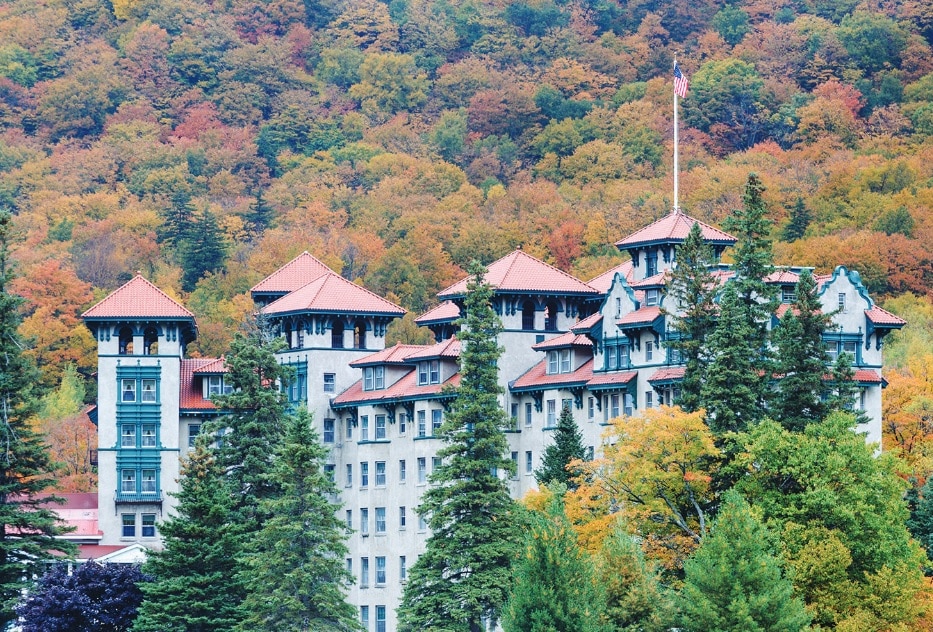
The man who helped save Fenway Park is on a new quest to save one of New England’s historic gems, The Balsam’s Resort in Dixville Notch. After a vote in the state legislature, Les Otten’s plans suddenly look much more promising.
The state Senate handed former Boston Red Sox minority owner Les Otten a big gift on April 18: Approval of a bill that would open up access to $28 million in financing for his dream of revitalizing a century-old resort nestled in the White Mountains.
The Balsams Grand Resort Hotel in Dixville Notch closed in 2011 after over 150 years in operation. Otten, who helped save Boston’s Fenway Park, joined the redevelopment effort in 2014.
The Senate voted unanimously to pass House Bill 540, which had earlier passed the House of Representatives by a wide margin after personal lobbying by Otten and North Country legislators.
The bill would let Coos County officials create a type of tax increment financing district covering the resort and funding a $28 million loan that would jump–start the over $170 million first phase of Otten’s planned expansion and redevelopment of the property.
“Certainly, we’re very pleased. We had very strong support in the House and we had pretty much unanimous support in the Senate,” said project spokesperson Scott Tranchemontagne.
As of this writing, Gov. Chris Sununu had told the New Hampshire Union Leader he would sign the bill but had not yet done so.
A Grand History
First opening as the Dix House during the Civil War, the 11,000-acre Dixville property became a haven for tycoons and movie stars fleeing the heat of the city in the summer months, and its owners developed a small ski area near the hotel, as well.
The resort also once boasted a nine-hole golf course and an 18-hole, par 72 championship course called “Panorama” by famed designer Donald Ross.
The Balsams was long famous, too, as the site of the first ballots cast in any presidential election. Dixville voters would troop into the resort, nestled in a bowl by a lake and embraced on three sides by verdant mountains, to cast ballots in the state’s presidential primary when the polls there opened just after midnight.
After the resort closed, it fell into disrepair and Otten and his team determined it would need a significant infusion of cash to get it going again. A $28 million, state-backed loan was sought through the New Hampshire Business Finance Authority. However, the redevelopment team and lead lender Service Credit Union withdrew its application in August 2018.
The team said its withdrawal resulted from positions taken by the authority on loan guarantee conditions that were “not contemplated” by the Balsams and were “inconsistent with its historical understanding of the proposed transaction.”
A New Tack, a New Hope
After that setback, Otten and the development team sought a new way to issue a bond without the state’s guarantee.
Otten asked legislators in Coos County, and then throughout the state, to support a TIF district for Dixville and allow the county to issue a $28 million bond from a private lender, a critical financing piece in the total $175 million redevelopment package.
Otten said in December the county wouldn’t own the bond and its involvement wouldn’t leave it or its taxpayers on the financial hook. Because The Balsams is located in an unincorporated part of Coos County, there is no local authority able to create the kind of TIF district, called a tax assessment district, its developers are seeking, necessitating the state legislature’s involvement.
Once Sununu signs HB 540, Coos County commissioners will have to hold public hearings and decide whether or not to go forward with creating the TIF district. Tranchemontagne said local officials will want to do their due diligence but the team hopes the process will wrap up within a few months.
“Locally, the support has been overwhelming. A petition was submitted with 500,550 names in support of the project,” he said, noting the resort’s 2011 closure seriously harmed the local economy. “The North Country understands what this means from an economic standpoint. There’s not a person up there I’ve met who doesn’t want to revitalize The Balsams.”
The development team is “actively talking” to potential investors in the bond right now, he added, should the county decide to create the tax assessment district.

Part of the plan’s revival hinges on making the resort a year-round destination with facilities like a Nordic spa and massive ski trails along with outdoor activities and indoor luxuries for more temperate seasons. Image courtesy of Samyn-D’Ella Architects
An Ambitious Rebirth
If all goes according to plan, The Balsams will be reborn in dramatic fashion.
The historic Dix and Hampshire houses would be renovated and brought into the 21st century. Some parts of Dix House would have to be rebuilt, Tranchemontagne said, as they can’t be saved following nearly 10 years of neglect.
On top of that, a whole new wing of the resort would be built along the lake, featuring many more guest rooms, a 600-seat conference center and other amenities.
A “Nordic spa” that evokes Iceland’s famed Blue Lagoon would be added, too, and joined to the property’s lodging areas with a marketplace for local crafts and produce. Year-round, guests would be able to enjoy farm-to-table dine dining at the resort’s restaurants.
The centerpiece of the resort’s revival, however, would be a huge expansion of the existing small ski area into a 500-acre area. Ultimately, it could become as big as 2,200 acres at full build-out, making it the biggest ski area in the region.
“Just in the construction alone we’d create 600 jobs. There would be another 400 jobs in phase one,” Tranchemontagne said. “If we build out over 10 years as we project, we’ll have created over 1,500 jobs.”
Material from the Associated Press was used in this report.

